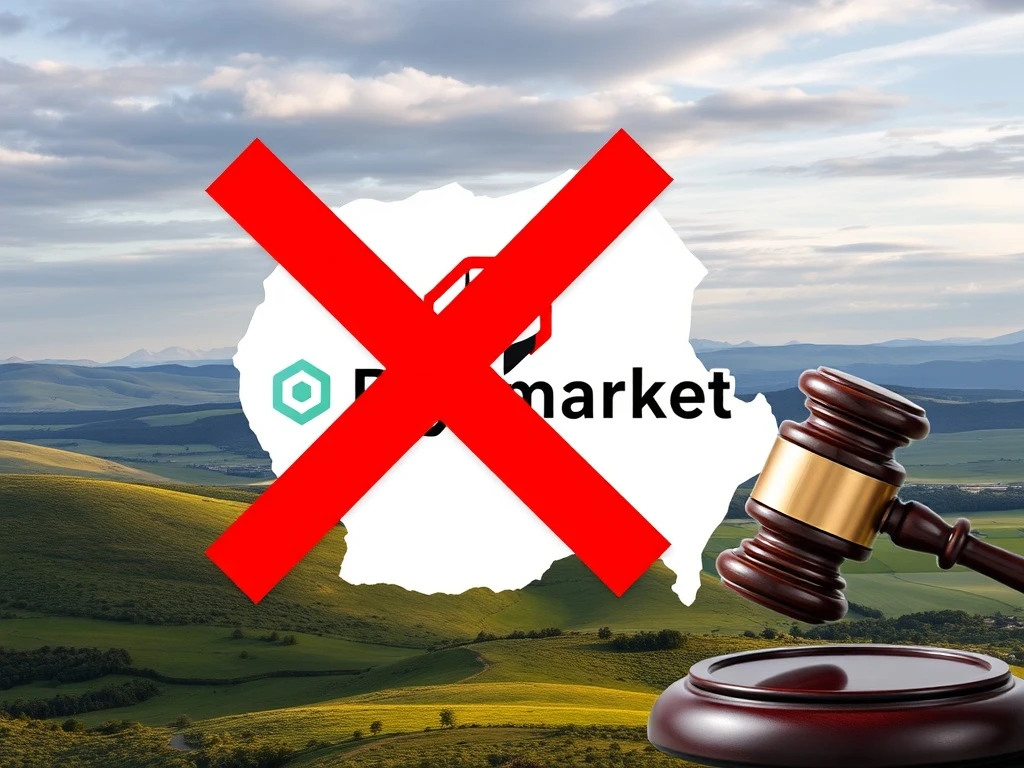Polymarket Faces **Severe** Blacklisting in Romania Amidst $600M Election Wagers

The landscape of decentralized finance (DeFi) continues to navigate complex regulatory waters. In a significant development, Romania’s National Office for Gambling (ONJN) has blacklisted leading prediction market platform Polymarket. This move follows a surge in crypto betting activities during recent Romanian elections, with Polymarket’s trading volume reportedly exceeding $600 million. This decision underscores a growing global trend of regulators scrutinizing blockchain-based platforms for compliance with traditional gambling and financial laws.
Romania Cracks Down on Unlicensed Crypto Betting
Romania’s National Office for Gambling (ONJN) recently declared Polymarket an unlicensed gambling platform. This designation means Polymarket operates outside state oversight. Regulators cited a dramatic increase in crypto-based betting during Romania’s presidential and local elections. According to the ONJN, Polymarket’s trading volume reportedly surpassed $600 million during this period. The regulator views Polymarket’s activity as “counterpart betting.” This model involves users wagering money against each other on future event outcomes. Such a structure falls directly under gambling laws, irrespective of its blockchain-based format. ONJN President Vlad-Cristian Soare emphasized that the action focuses on law, not technology. He stated that bets, whether in lei or crypto, qualify as gambling and require licensing. This firm stance highlights the challenges decentralized platforms face in traditional legal frameworks.
Global Regulatory Scrutiny for Prediction Markets
Romania’s ban on Polymarket is not an isolated incident. It mirrors similar crackdowns observed worldwide. Regulators in the US, France, Belgium, Poland, Singapore, and Thailand have all cited unlicensed gambling activity as grounds for restriction. In 2022, the US Commodity Futures Trading Commission (CFTC) fined Polymarket. The platform had operated unregistered derivatives markets. Consequently, it blocked American users. Despite these significant regulatory hurdles, Polymarket continues to grow. The platform recently secured a substantial $2 billion investment from Intercontinental Exchange. Intercontinental Exchange is the parent company of the New York Stock Exchange. This investment demonstrates a strong belief in the future of prediction markets, even amidst ongoing legal battles.
Romania’s Legal Basis: Event Trading or Gambling?
Authorities in Romania crypto regulation cited several violations. These included a lack of fiscal reporting and player protection mechanisms. Furthermore, they noted insufficient Anti-Money Laundering (AML) oversight. Polymarket brands itself as an “event trading” platform. However, the ONJN argued its structure meets all legal definitions of gambling. Users bet money on uncertain outcomes, and the platform collects a commission. This model, regardless of its blockchain foundation, is deemed gambling. Therefore, Romanian internet providers must now block access to the site. This action underscores a fundamental conflict. Regulators often struggle to categorize innovative blockchain applications within existing legal frameworks. The outcome often depends on interpretation rather than technological specifics.
Polymarket’s Resilient Strategy and US Comeback Efforts
Despite numerous international setbacks, Polymarket is actively preparing for a return to the US market. The platform reportedly plans to resume trading within weeks. Initially, it will focus on sports-related markets. According to Bloomberg, Polymarket aims to reopen limited trading for US users before November’s end. This strategic move follows a crucial development: the CFTC issued a no-action letter to a crypto derivatives exchange acquired by Polymarket. This letter effectively clears the path for its relaunch in the US. This demonstrates Polymarket’s determination to navigate regulatory landscapes. It also highlights the evolving nature of crypto regulation globally. The platform seeks to establish compliant operations in key markets, showcasing its adaptability.
Broader Implications for Crypto Regulation and Prediction Markets
The regulatory actions against Polymarket in Romania and other nations signal a broader trend. Governments worldwide are intensifying their scrutiny of decentralized platforms. They aim to ensure compliance with established financial and gambling laws. This ongoing tension between innovation and regulation impacts the entire crypto ecosystem. Prediction markets, by their nature, involve forecasting outcomes. This often places them squarely in the crosshairs of gambling authorities. As a result, platforms must adapt or face blacklisting. The incident highlights the need for clearer regulatory frameworks. Such frameworks would distinguish between speculative trading and traditional gambling. Without clear guidelines, platforms like Polymarket will continue to encounter fragmented and often contradictory legal challenges. This creates uncertainty for both operators and users.
The Future of Crypto Betting and Decentralized Platforms
The situation with Polymarket in Romania offers critical lessons for the future of crypto betting. It underscores the importance of proactive engagement with regulators. Platforms must demonstrate robust compliance measures. These include fiscal reporting, player protection, and AML oversight. As the crypto industry matures, regulatory clarity will become paramount. This will foster innovation while protecting consumers. The continued growth of prediction markets, despite regulatory hurdles, indicates strong user demand. However, achieving mainstream adoption requires navigating these complex legal environments successfully. This balance between decentralization and regulatory compliance remains a central challenge for the entire crypto space.








